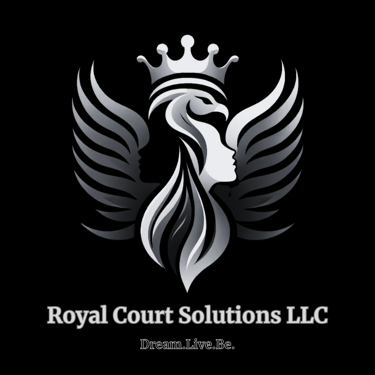How Do I Find My Limiting Beliefs?
Learn how to find and overcome your limiting beliefs to unlock personal freedom and achieve your goals. Discover the steps to self-reflection, identifying patterns, challenging and reframing beliefs, adopting a growth mindset, and practicing self-compassion. Start your transformative journey today!
EMPOWERMENT AND PERSONAL DEVELOPMENT
Coach Clarice Corinn
6 min read


Embarking on a journey of self-discovery can be both exciting and daunting. In the transformative world of Clarice Corinn, a certified life coach, you will find the guidance and support needed to uncover your limiting beliefs. Clarice Corinn, the driving force behind Royal Court Solutions LLC, is committed to empowering ambitious, empathetic, and spiritual women who have weathered heartbreak.
By unlocking the doors to personal freedom and emotional stability, Clarice will help you break free from self-imposed limitations and embrace the extraordinary individual you were meant to be. So, if you're ready to thrive and live a life of purpose, resilience, and flourishing relationships, take the first step on this transformative path and discover how to find your limiting beliefs.
Understanding Limiting Beliefs
Limiting beliefs are deeply ingrained thoughts or beliefs that hold you back from reaching your full potential. They are often negative and self-limiting, causing you to doubt yourself and your abilities. These beliefs can stem from various sources, such as childhood experiences, social conditioning, and negative self-talk. Understanding and addressing these limiting beliefs is crucial for personal growth and achieving your goals.
The Impact of Limiting Beliefs
Limiting beliefs can significantly impact your life and overall well-being. They can create self-doubt, fear, and a sense of limitation that prevents you from taking risks or pursuing opportunities. These beliefs can also lead to repetitive or self-sabotaging behaviors and negative self-perception. They can hold you back from realizing your true potential and living a fulfilling life.
Identifying Your Limiting Beliefs
To overcome limiting beliefs, it is essential first to identify them. Reflecting on your thoughts and behaviors can help uncover these beliefs. Pay attention to recurring negative thoughts or patterns that arise in specific situations. Ask yourself what beliefs or fears might be at the root of these patterns. Journaling can also be a helpful tool for self-reflection and uncovering limiting beliefs.
Exploring the Root Causes
Understanding the root causes of your limiting beliefs is crucial for addressing and reframing them. Childhood experiences play a significant role in shaping our beliefs about ourselves and the world. Negative experiences or messages received during childhood can create deep-seated beliefs that continue to influence our thoughts and behaviors in adulthood.
Social conditioning, including cultural norms and societal expectations, can also contribute to limiting beliefs. These external influences shape our views and beliefs, often, without us realizing it. Negative self-talk, the inner dialogue we have with ourselves, is another factor that perpetuates limiting beliefs. Becoming aware of these root causes allows us to challenge and change our beliefs.
Recognizing Patterns and Behaviors
One way to identify limiting beliefs is by recognizing patterns and behaviors that hold you back. Pay attention to any repetitive or self-sabotaging behaviors that occur in your life. These behaviors often stem from underlying limiting beliefs. For example, if you repeatedly avoid new opportunities or shy away from taking risks, it may be a sign of a belief that you are not capable or deserving of success.
Negative self-perception is another indicator of limiting beliefs. If you constantly criticize or underestimate yourself, it may be a reflection of deeply ingrained beliefs about your worth or abilities. Fear and avoidance are also common symptoms of limiting beliefs. Notice when you feel fear or the urge to avoid certain situations, as it may indicate a belief that you are not capable or that failure is inevitable.
Self-Reflection and Journaling
Self-reflection is a powerful tool for uncovering and addressing limiting beliefs. Taking the time to introspect and analyze your thoughts and beliefs can lead to significant personal growth. Consider setting aside dedicated time for self-reflection each day or week. This could involve meditation, deep thinking, or simply being alone with your thoughts.
Journaling is an effective technique for self-reflection and exploring limiting beliefs. It allows you to document your thoughts and emotions, providing clarity and insight into your inner world. Consider using prompts to guide your journaling practice. Some prompts for exploring limiting beliefs could include:
What beliefs about myself or the world hold me back from pursuing my dreams?
When do I feel the most self-doubt or fear? What beliefs might contribute to these emotions?
How have my childhood experiences shaped my beliefs about myself and my abilities?
What societal expectations or cultural norms have influenced my beliefs? How do they limit me?
What negative self-talk patterns do I engage in? How do they reinforce my limiting beliefs?
Seeking Feedback and Support
Addressing limiting beliefs can be challenging, but seeking feedback and support from others can be immensely helpful. Trusted friends and family members can offer different perspectives and insights into your beliefs and behaviors. They can also provide encouragement and support as you work on reframing your beliefs.
Mentors or coaches are another valuable resource for addressing limiting beliefs. They can provide guidance, tools, and strategies for challenging and reframing negative beliefs. Their expertise and experience can help you navigate the process of personal growth and self-discovery.
Therapy or counseling is another option for addressing and overcoming limiting beliefs. Licensed professionals can help you delve deeper into the root causes of your beliefs and provide therapeutic techniques to challenge and reframe them. They can offer a safe and supportive space for exploring and addressing your limiting beliefs.
Challenging and Reframing Beliefs
Once you have identified your limiting beliefs, it is essential to challenge and reframe them. Examining evidence and alternatives is a powerful way to challenge negative beliefs. Ask yourself if there is concrete evidence that supports or contradicts your beliefs. Consider alternative perspectives and possibilities that counteract your limiting beliefs.
Replacing limiting beliefs with empowering beliefs is a key step in reframing your mindset. Create affirmations or positive statements that counter your negative beliefs. For example, if you believe you are not smart enough to pursue a certain career, reframe it as "I am intelligent and capable of success in any field I choose." Repeat these affirmations regularly to reinforce your new empowering beliefs.
Engaging in positive self-talk is another effective way to challenge and reframe limiting beliefs. Monitor your internal dialogue and consciously replace negative self-talk with positive and supportive messages. Encourage yourself and acknowledge your strengths and accomplishments. Over time, this positive self-talk will help rewire your mindset and replace limiting beliefs with empowering ones.
Embracing a Growth Mindset
Adopting a growth mindset is essential for overcoming limiting beliefs and fostering personal growth. A growth mindset is characterized by a belief that abilities and intelligence can be developed through dedication and hard work. Embrace a mindset of curiosity and a willingness to learn and grow.
View failures as learning opportunities rather than setbacks. Instead of seeing failure as evidence of your limitations, see it as a stepping-stone towards growth and improvement. Celebrate your efforts and progress, even when the outcome does not meet your expectations. Embracing a growth mindset allows you to approach challenges with resilience and a willingness to learn from mistakes.
Setting realistic goals is also crucial for embracing a growth mindset. Break down your larger goals into smaller, achievable steps. Celebrate each milestone along the way, acknowledging your progress and growth. This cultivates a sense of accomplishment and further reinforces your belief in your abilities.
Practicing Self-Compassion
Practicing self-compassion is vital when addressing limiting beliefs. Cultivate self-acceptance and embrace your imperfections and vulnerabilities. Recognize that everyone has limiting beliefs, and it is a normal part of the human experience. Treat yourself with kindness and understanding as you work on challenging and reframing your beliefs.
Manage negative self-judgment by observing your self-talk and challenging harsh self-criticism. Replace self-judgment with self-compassionate and supportive thoughts. Remind yourself that you are doing your best and that personal growth takes time and effort. Treat yourself as you would treat a close friend or loved one, with kindness, empathy, and understanding.
Developing self-care routines is another crucial aspect of practicing self-compassion. Take care of your physical, mental, and emotional well-being by engaging in activities that nourish and rejuvenate you. This can include exercise, mindfulness practices, spending time in nature, or pursuing hobbies and interests that bring you joy. Prioritize self-care as an essential part of your journey towards overcoming limiting beliefs.
Taking Action and Building New Habits
Taking action is a crucial step in overcoming limiting beliefs and creating lasting change. Create an action plan that outlines specific steps you will take to challenge and reframe your beliefs. Break your plan into smaller, manageable tasks that you can consistently work on.
Accountability and consistency are key when building new habits and challenging limiting beliefs. Find ways to hold yourself accountable, whether it's by partnering with a friend or using a habit-tracking app. Set reminders and create a supportive environment that encourages and motivates you to stick to your action plan.
Implementing new habits takes time and effort. Be patient with yourself and celebrate small victories along the way. Acknowledge the progress you are making, even if it seems incremental. Each small step forward contributes to the overall transformation and growth you are striving for.
Monitoring Progress and Celebrating Success
Monitoring your progress and reflecting on your growth is essential to overcoming limiting beliefs. Keep track of the changes you observe in your thoughts, behaviors, and mindset. Write down moments of self-doubt you have overcome or instances where you acted counter to your limiting beliefs. These tangible reminders serve as evidence of your growth and progress.
Reflect on the challenges you have overcome throughout your journey. Celebrate the milestones, no matter how small they may seem. Recognize the courage and determination it took to challenge your limiting beliefs and create positive change in your life. Reward yourself for your efforts and acknowledge the significance of your achievements.
You can embark on a transformative journey toward personal growth and fulfillment by understanding, challenging, and reframing your limiting beliefs. Remember that it is a continuous process requiring dedication and self-compassion. Embrace the extraordinary individual you were always meant to be and live a life of purpose, resilience, and flourishing relationships.
Location:
Royal Court Solutions is now fully virtual. Coaching sessions, workshops, and consultations are delivered online.
© 2025 Royal Court Solutions LLC. All Rights Reserved.
Mailing Address (for correspondence and packages only):
111 N 6th St, #1662
Rockford, IL 61110
Please note: This is a mailing address only. Services are delivered virtually.
